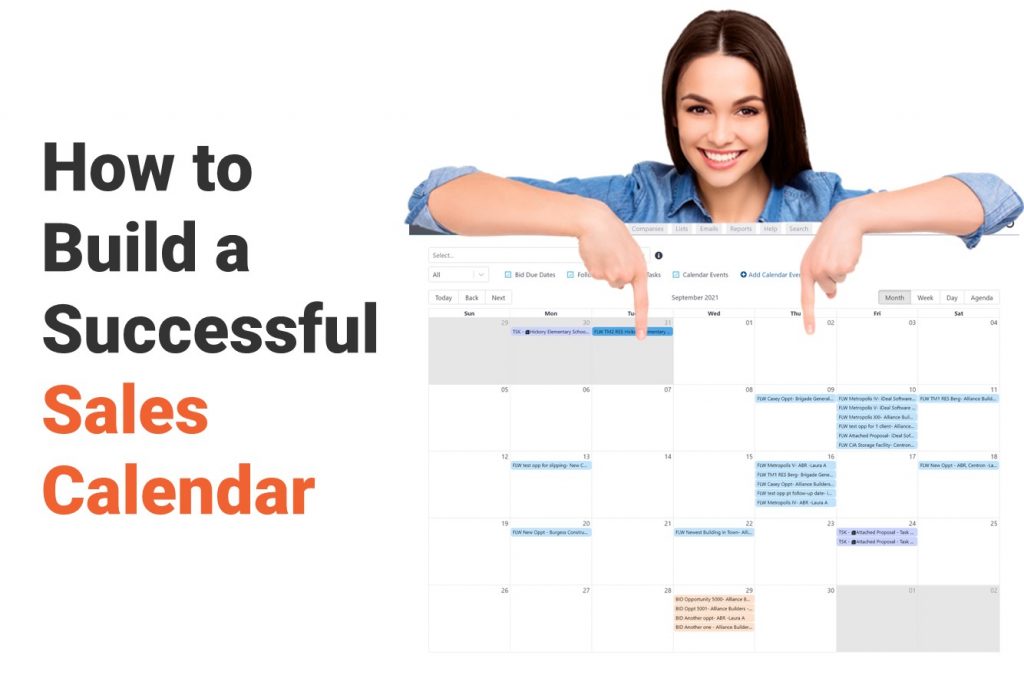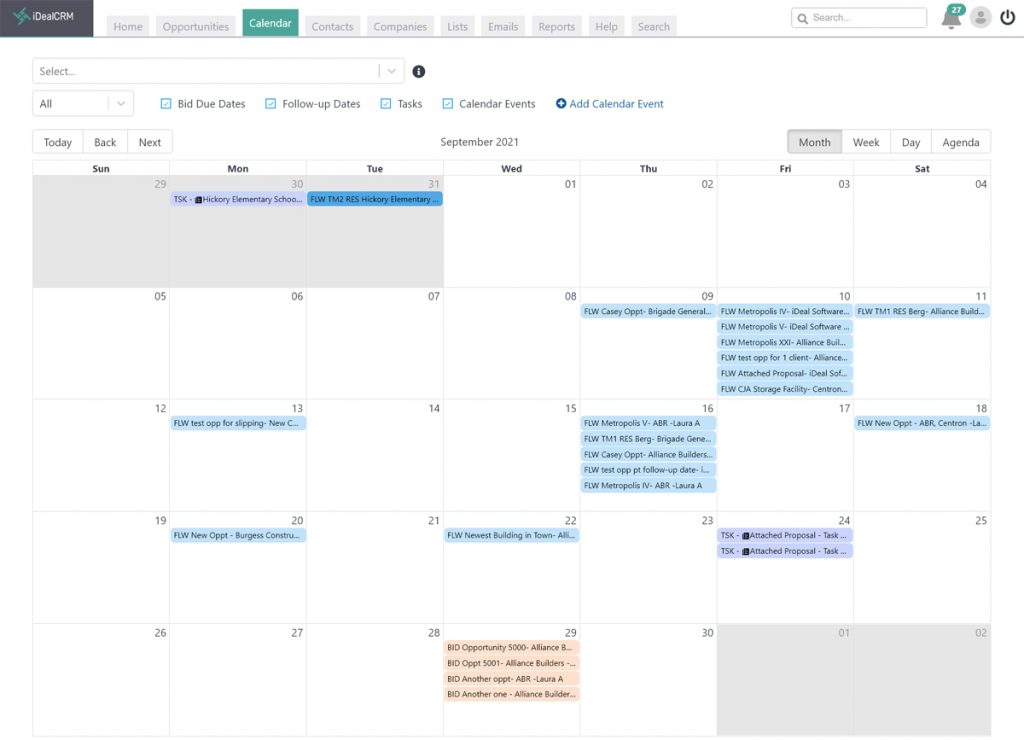A successful sales calendar keeps construction sales representatives focused on the right opportunities and sales activities to meet their sales goals.
- What is a sales calendar
- The importance of a sales calendar
- What should be included on a sales calendar
- Calendar Tools
- Benefits of using a sales calendar

What Is a Sales Calendar
A sales calendar is a tool that is used for planning, organizing, and tracking sales activities for a given period of time. It is a tool that provides a way to stay organized and prioritize your sales activities so you can hit your weekly goals. A sales calendar helps you focus on the right opportunities in order to generate the highest revenue. You also begin to understand when to delegate certain tasks so that no opportunity falls through the cracks. A company-wide calendar is a shared sales calendar that’s accessible to everyone on the team. This provides a centralized location for all sales activities for your entire sales team in a straightforward, well-organized way such that everyone can focus their efforts on the tasks assigned to them.
The Importance of a Sales Calendar in Construction
Sales is a field that’s often perceived to be exciting and dynamic. The ability to close deals and make money is a challenge that many people find exciting and rewarding. While this is true, the role is also very complex. One of the biggest challenges for many salespeople is finding a way to stay organized and prioritize their activities so they can hit their weekly goals. A well-defined, accessible sales calendar is essential to keep your sales representatives focused on the right opportunities and sales activities.
When you first get into sales, you’re usually given a sales calendar to help you plan your days. A sales calendar helps you focus on the right opportunities in order to generate the highest revenue. You also begin to understand when to delegate certain tasks so that no opportunity falls through the cracks.

What Should Be Included on a Construction Sales Calendar
The first steps in creating a sales calendar are to set sales goals for your construction sales team and to identify your personal sales priorities for the month. What goes on a sales calendar has very much to do with how your company operates and what sales activities you perform. Here are some of the things you should include in your sales calendar. They are organized into six categories:
Meetings
Virtual and In-person Meetings
Meetings are one of the most important tasks of a sales representative. Meetings help you build a relationship with your customers and potential partners. The meetings you plan should be relevant to your sales activities. Schedule them on a shared sales calendar so your salespeople can stay focused on your opportunities.
Opportunity and Proposal Due Dates on Your Sales Calendar
Even though due dates are not actual activities that need a block of time on your calendar, you should add these to your sales calendar, preferably in a different color, so you don’t miss the due dates. Proposals are one of the most important aspects of a sales calendar and also a critical element to the success of your business. They are a key element in closing a client. If a client requests a proposal on a certain date and before a certain time, make sure you send them out on time. There are many industries in which late proposals are not even considered, they are plainly dismissed. You may be the lowest bidder or the best value bidder, but if your proposal doesn’t reach the client in time, you lost the opportunity.
Calls: Cold Calls, Customer Calls
Cold calls are scheduled calls that are made to potential customers and clients to generate new business. The best way to schedule cold calls is to put a block of time on your calendar depending on when your potential clients are more likely to answer the phone.
For example, if your target market are small business in the construction industry and you’re targeting executives, you may want to block a couple hours at the end of the day to call them. It is more likely that they’ll give you a few minutes of their time at the end of the day. Or if you’re targeting 1-man shops and you are calling the owners, evenings and Saturdays may be your best bet.
Also, it’s important to schedule regular calls with your customers. This is a great way to keep your products and services top of mind.
Proposals: Writing and Sending
Writing and sending proposals on time is one of the most important responsibilities a sales person or estimator has. Depending on the type of organization you work for, you might have to:
- Estimate project/opportunity cost
- Write up the proposal
- Send it out for review and obtain approval
- Send it out to the client
- Follow-up on the proposal
Make sure you alot and block the appropriate amount of time on your calendar for handling proposals. If you see on a calendar that a proposal is due on a Tuesday, block the required amount of time needed to write and get your proposal approved on Monday so you can send it out on Tuesday.
Proposal Follow-up Calls and Emails
This is another important activity to schedule separately on your sales calendar. And it is, more often than not, the one that salespeople miss the most. Schedule time on your calendar for phone calls and emails after you send proposals. This allows you to stay in touch with customers, overcome any issues, and provide any additional information they may need in order to make a decision favorable to you..
Answering Emails
One of the most important parts of being a successful sales rep is being able to answer emails and questions. While important emails should be answered as fast as possible so you don’t miss opportunities, we suggest leaving a block of time at the end of each day to answer any remaining emails.
Calendar Tools for Construction
There are several tools you can use to build an individual or company sales calendar.
CRM Calendar
A CRM Calendar is the best format for a sales calendar because you have all your sales data centralized in one system. When looking for a CRM solution, make sure you look for an industry-specific one that satisfies all or most of your needs. Also, if your company uses Outlook as a shared calendar for the entire company, make sure that the CRM calendar integrates with it so you have all of your company’s activities in one place.
For example, if your company is in the construction industry, a generic CRM will not match your sales process. But a solution like iDeal CRM for Construction will fit all your processes and needs. iDeal is also equipped with a Construction Bid and Follow-up Calendar. A shared calendar for your entire sales team that shows all your bid due dates, follow-up dates, tasks, and events. It even integrates with Gmail or Outlook calendars.

Google Calendar or Outlook Calendar
Google Calendar, Outlook Calendar, and other similar email-based calendars are a great way to keep track of your sales activities. You can set up different calendars for different teams, clients, and even regions so that you can stay on top of the different events and meetings that are happening. This not only helps you stay organized, but also provides a place for your teammates to coordinate with each other and set meeting times.
The downside of these email-based calendars is that you don’t have visibility into all your sales data such as opportunities, proposals, contracts, recurring contracts, bid due dates, and more.
Benefits of Having a Sales Calendar
As the tool you use to schedule your sales activities, a sales calendar helps you and your sales team:
- Organize your time
- Ensure you are working on the right opportunities
- Plan for the week ahead
- Meet your weekly sales goals
- Plan your travel and expenses if applicable
- Stay organized
